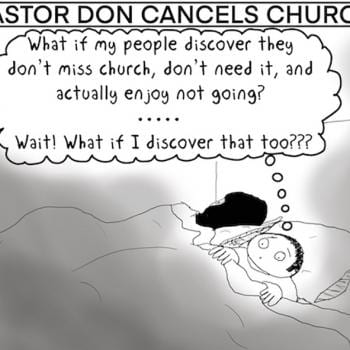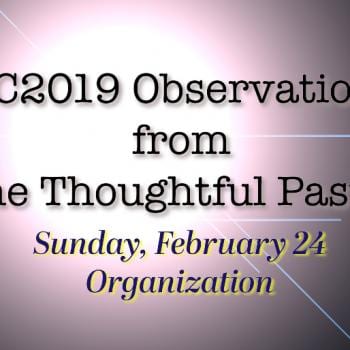Evil is often disguised in a subtle call to comfort, to security, to safety. It will involve only the smallest of compromises.

Dear Thoughtful Pastor: There is evil in the world, at many levels, from government and business, down to communities and ourselves. On encountering evil, what is our Christian responsibility, either as a church or individual?
Ignore it, avoid it, confront it or something else? It seems like we should be taking some action, but often it seems like there is nothing we can do practically or safely, or that might even make a dent in the problem.
I recently read and reviewed a book by Erin Straza called Comfort Detox: Finding Freedom from the Habits that Bind You. I was exhausted by the time I finished it. There was nothing wrong with the premise. The author repeatedly insisted we leave behind our worship of comfort and more fully, and with far more vulnerability, address societal needs.
However, as I read, I became more aware that none of us can solve all of the manifestations of evils and injustices and resultant human needs. We tend then just to toss up our hands in despair and say, “Why try?”
I put the book down saying, “It’s just too much for any one person to do.” Hence my exhaustion.
As you noted, can anything we do make a dent in the problem?
We mourn the loss of the village
It dawned on me that I, perhaps with many others, mourn the loss of the village–the place where “everybody knows your name.” In smaller communities, people can and do keep an eye on each other. There is less likelihood of falling between the cracks because it is more obvious when someone is missing or ill or being mistreated.
The community has power in the village.
In the village, it’s OK for non-family members to admonish children.
In the village, we know when someone is gone. It is normal for neighbors to pick up mail and newspapers, to keep an eye on temporarily empty houses.
In the village, the gossip grapevine performs essential tasks. Because people talk, the sick get to doctors, truant kids get sent back to school, and the bereaved receive meals and care. That grapevine helps set limits to the bounds of acceptable behavior.
The scorn of the community carries real power. I’m not suggesting that this is an ideal world, but the connectedness helps. It’s simply harder to hide in the village.
Now, while we may have giant circles of acquaintances, few of us actually know our neighbors. We may have no idea what is going on behind our next door neighbor’s closed door, but the unrelenting firehose of information about scandals nearby and horrific events on the other side of the world leaves us numb and helpless.
So we shut down, build fortresses, stockpile our resources and hope nothing bad happens to our loved ones. The move to isolation is possibly the worst of solutions, but it is also the most common and most understandable.
The subtlety of evil
Unfortunately, I don’t think it is possible to stand up to evil without sacrificing some measure of safety and comfort.
And that’s part of the problem. Evil is often disguised in a subtle call to comfort, to security, to safety. It will involve only the smallest of compromises, a little shading of core ethics, a little silence when someone else, some “other” gets hurt.
One of the easiest ways for us as individuals, and churches as groups of individuals, to cross over into evil is to give into the idea that “it doesn’t matter anyway in the big scheme of things.”
But it does matter. The big scheme of things is entirely dependent on little, tiny actions.
It genuinely matters if, when you see a bully in action, you step in to stop it. When you stop one small bully from hurting a peer, you help prevent a larger bully from starting a war.
When you help one family in your neighborhood stay out of homelessness and despair, you start a chain of hope that brings the next family along.
When you teach one child to read and love the world of literature and careful thought, you bring light to a whole new generation.
When you stop one lie from being perpetuated, you stop the thousands of lies that must follow any initial lie to keep it propped up.
But each of the things I’ve mentioned here requires that in some way we choose less safety. To help one family stay out of homelessness may take financial and emotional support effort from an entire church.
Teaching one child to read demands a commitment over an extended period of time–and may mean filling up a too-empty tummy or buying needed school supplies as well.
Standing against a lie means an inevitable pushback from the liar.
As for stopping the bullying? It definitely leaves you at risk of the bully turning on you as the next victim.
But our only other option is to do nothing and let evil have its way.
 [Note: a version of this column is slated to run in the February 17, 2017, edition of the Denton Record-Chronicle. The Thoughtful Pastor, AKA Christy Thomas, welcomes all questions for the column. Although the questioner will not be identified, I do need a name and verifiable contact information in case the newspaper editor has need of it. You may use this link to email questions.]
[Note: a version of this column is slated to run in the February 17, 2017, edition of the Denton Record-Chronicle. The Thoughtful Pastor, AKA Christy Thomas, welcomes all questions for the column. Although the questioner will not be identified, I do need a name and verifiable contact information in case the newspaper editor has need of it. You may use this link to email questions.]
















